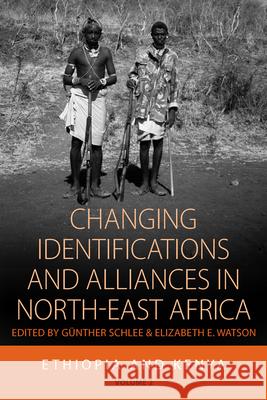Changing Identifications and Alliances in North-East Africa: Volume I: Ethiopia and Kenya » książka
Changing Identifications and Alliances in North-East Africa: Volume I: Ethiopia and Kenya
ISBN-13: 9781782383291 / Angielski / Miękka / 2013 / 272 str.
Changing Identifications and Alliances in North-East Africa: Volume I: Ethiopia and Kenya
ISBN-13: 9781782383291 / Angielski / Miękka / 2013 / 272 str.
(netto: 128,78 VAT: 5%)
Najniższa cena z 30 dni: 134,94
ok. 30 dni roboczych
Dostawa w 2026 r.
Darmowa dostawa!
Forms of group identity play a prominent role in everyday lives and politics in northeast Africa. Case studies from Sudan, Ethiopia, Uganda, and Kenya illustrate the way that identities are formed and change over time, and how local, national, and international politics are interwoven. Specific attention is paid to the impact of modern weaponry, new technologies, religious conversion, food and land shortages, international borders, civil war, and displacement on group identities. Drawing on the expertise of anthropologists, historians and geographers, these volumes provide a significant account of a society profoundly shaped by identity politics and contribute to a better understanding of the nature of conflict and war, and forms of alliance and peacemaking, thus providing a comprehensive portrait of this troubled region. Gunther Schlee is currently the director of the Department of Integration and Conflict at the Max Planck Institute for Social Anthropology. His publications include Identities on the Move: Clanship and Pastoralism in Northern Kenya (International African Institute, 1989), How Enemies are Made (Berghahn, 2008), Rendille Proverbs in their Social and Legal Context (with Karaba Sahado) and Boran Proverbs in their Cultural Context (with Abdullahi Shongolo) (both Cologne: Rudiger Koppe). Elizabeth E. Watson is a Lecturer in the Department of Geography at the University of Cambridge. Recent publications include: 'Local Community, Legitimacy, and Cultural Authenticity in Postconflict Natural Resource Management: Ethiopia and Mozambique' in Environment and Planning D: Society and Space, 2006 (with R. Black), and 'Making a Living in the Post-Socialist Periphery: Konso, Ethiopia' in Africa, 2006.
Forms of group identity play a prominent role in everyday lives and politics in northeast Africa. Case studies from Sudan, Ethiopia, Uganda, and Kenya illustrate the way that identities are formed and change over time, and how local, national, and international politics are interwoven. Specific attention is paid to the impact of modern weaponry, new technologies, religious conversion, food and land shortages, international borders, civil war, and displacement on group identities. Drawing on the expertise of anthropologists, historians and geographers, these volumes provide a significant account of a society profoundly shaped by identity politics and contribute to a better understanding of the nature of conflict and war, and forms of alliance and peacemaking, thus providing a comprehensive portrait of this troubled region.Günther Schlee is currently the director of the Department of Integration and Conflict at the Max Planck Institute for Social Anthropology. His publications include Identities on the Move: Clanship and Pastoralism in Northern Kenya (International African Institute, 1989), How Enemies are Made (Berghahn, 2008), Rendille Proverbs in their Social and Legal Context (with Karaba Sahado) and Boran Proverbs in their Cultural Context (with Abdullahi Shongolo) (both Cologne: Rüdiger Köppe).Elizabeth E. Watson is a Lecturer in the Department of Geography at the University of Cambridge. Recent publications include: Local Community, Legitimacy, and Cultural Authenticity in Postconflict Natural Resource Management: Ethiopia and Mozambique in Environment and Planning D: Society and Space, 2006 (with R. Black), and Making a Living in the Post-Socialist Periphery: Konso, Ethiopia in Africa, 2006.











